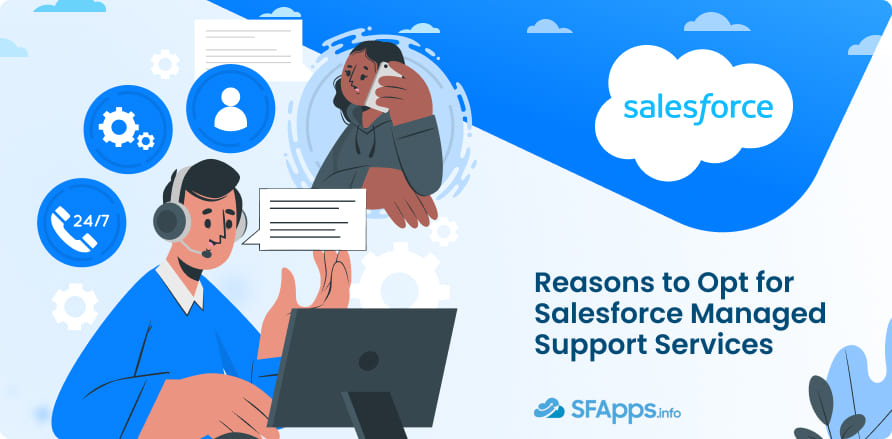
Managed Salesforce Support Services in a Nutshell
Managing Salesforce can be challenging. Businesses use it to track customers, sales, and operations, but keeping everything up to date takes time and effort. If something goes wrong, finding and fixing the issue can be difficult. Many companies do not have enough Salesforce experts on their teams, which can lead to delays and mistakes.
Salesforce managed support helps businesses by providing a team of professionals who handle everything related to Salesforce. They take care of system maintenance, user support, updates, and troubleshooting. If a report is not working, a workflow stops, or a new feature needs to be set up, the support team takes care of it.
Many companies are looking for ways to hire Salesforce on demand services. Offshore and nearshore service providers could offer a solution, when companies do not need to hire and train new employees for Salesforce-related tasks. They can rely on experienced specialists who understand how Salesforce works and can fix problems quickly. This helps businesses save time, avoid errors, and focus on their work without worrying about Salesforce issues.
- Roles Inside a Managed Salesforce Support Team
- Salesforce Managed Services Pricing
- Reasons to Opt for Salesforce Offshore Support
- When Not to Use Outsource Salesforce Support Services
- A Guide to Choosing the Top Salesforce Managed Support Service Provider
- Frequently Asked Questions about Outsourcing Salesforce Support Services
- 1. What types of businesses benefit most from managed Salesforce support?
- 2. How do I know if I need managed Salesforce support?
- 3. Are offshore Salesforce support services reliable?
- 4. Can I switch providers if I'm not satisfied?
- 5. What happens if my business needs changes?
- 6. How can I ensure the provider understands my industry?
- 7. What should I do if I have a critical issue outside business hours?
- Conclusion
Roles Inside a Managed Salesforce Support Team
A managed Salesforce support team has different roles to ensure effective help for businesses. Here are some common roles:
- Salesforce Administrator: This person manages user accounts, permissions, and data within Salesforce. They handle user requests and help resolve issues that arise. Administrators ensure that the system is working well and that users have the access they need.
- Salesforce Developer: Developers create custom features and solutions in Salesforce. They write code to build applications, develop new functionalities, and integrate Salesforce with other systems. Their work allows businesses to tailor Salesforce to meet their specific needs.
- Support Specialist: This role is focused on daily support requests from users. Support specialists troubleshoot problems, answer questions, and guide users on how to use Salesforce effectively. They play a crucial role in making sure that users have a good experience with the platform.
- Business Analyst: Business analysts gather requirements from users and translate them into technical solutions. They work closely with both users and developers to ensure that Salesforce meets the business’s needs. Their insights help improve processes and the overall use of Salesforce.
- Quality Assurance Tester: Testers are responsible for checking the system for bugs and issues. They conduct tests on new features and functionalities to ensure they work correctly before being implemented. This role is essential for maintaining the quality and reliability of the Salesforce system.
- Project Manager: The project manager oversees projects related to Salesforce, making sure they are completed on time and within budget. They coordinate the efforts of the team, manage resources, and communicate with stakeholders to keep everyone informed about project progress.

By using managed Salesforce support services offshore, businesses can access these roles without the need to hire full-time employees. Offshore teams often provide a cost-effective solution, allowing companies to receive expert support while focusing on their core operations. This setup helps businesses stay responsive to their needs while ensuring that their Salesforce platform remains effective and up-to-date.
Salesforce Managed Services Pricing
When considering pricing for Salesforce offshore support, businesses can often find more competitive rates compared to local services. Offshore teams may offer similar quality support at a lower cost due to differences in labor costs. Outsourcing support services can help companies save money while still receiving quality assistance from experienced professionals.
Here are some common pricing models:
Hourly Rate
This model charges businesses for the actual time the support team spends working on their Salesforce issues or projects. It is ideal for companies that need occasional support or have specific tasks that require immediate attention. The average hourly rate for Salesforce admin in the USA is $42.16 by Salary Expert, and for Salesforce developer is $61.75 by Indeed. However, when you hire managed Salesforce admin support, the price per hour may be within ranges of $40-$60.
Monthly Retainer
In this arrangement, businesses pay a set fee each month for ongoing support. This can include a certain number of hours for assistance, maintenance, and updates. It is beneficial for companies that require regular help and want to ensure their Salesforce system is consistently monitored. Managed Salesforce service package may cost $900-1200 per 20 hours per month. However, for highly specialized tasks or premium services, costs can go up to $3,000, depending on the provider and task complexity.
Project-Based Pricing
This pricing model offers fixed rates for specific support services or tasks. Businesses can discuss their needs and agree on a cost before the work begins. Depending on the complexity, project-based pricing for support services typically ranges from $1,000 to $10,000. This option is useful for companies looking to implement a new feature, perform system upgrades, or complete data migrations without unexpected expenses.
Pay-As-You-Go
This flexible pricing option allows businesses to pay for support as needed. They can request assistance whenever required, without being tied to a long-term commitment. On-demand support typically costs between $50 and $250 per hour, depending on the complexity of the task and the provider’s expertise. This model is suitable for companies with fluctuating support needs or those who want to manage costs closely.
Custom Pricing
Some providers offer tailored pricing plans based on the unique needs of a business. This can include specific types of support, project requirements, or additional services. Custom pricing is helpful for businesses with specialized needs or complex Salesforce environments that require a more personalized approach.
Reasons to Opt for Salesforce Offshore Support
Choosing managed support services can offer numerous advantages for businesses. Here are some key reasons to consider this option:
- Expertise: Support services provide access to a team of skilled professionals who understand Salesforce well. This expertise ensures that businesses receive effective solutions to their problems.
- Cost Savings: By choosing Salesforce offshore support services, companies can often reduce costs by 30% to 50% compared to hiring full-time employees. Offshore teams may offer competitive rates without compromising quality.
- Time Efficiency: Outsourcing support allows businesses to focus on their core operations while leaving Salesforce management to experts. This can lead to quicker resolutions of issues and less downtime.
- Scalability: Managed support services can easily adapt to changing business needs. Companies can increase or decrease their support as necessary, ensuring they always have the right level of assistance.
- Reduced Workload: With a dedicated support team, internal staff can spend less time on Salesforce-related tasks. This helps to reduce their workload and allows them to concentrate on other important responsibilities.
- 24/7 Availability: Many managed support services offer around-the-clock assistance. This means that help is available whenever it is needed, reducing the impact of issues that occur outside regular business hours.
- Regular Maintenance: Managed services include routine checks and updates, which help keep Salesforce running smoothly. This proactive approach can prevent problems before they arise.
- Improved User Satisfaction: Having a dedicated support team helps ensure that user questions and issues are addressed quickly. This leads to higher satisfaction among employees who rely on Salesforce for their work.
Insight:
Customer expectations are changing a lot. This means customers want faster service, better quality, and more personal attention than before. Businesses need to adjust to these new needs to stay competitive and keep their customers happy.
- Evolving Needs: Customer preferences and needs are not static; they are continually changing based on various factors, including experiences with other businesses and advancements in technology.
- Increased Demands: Customers are likely expecting faster service, higher quality, and more personalized interactions than they did in the past.
- Impact on Businesses: Businesses need to recognize and adapt to these changing expectations to remain competitive and meet customer satisfaction. Failing to do so may result in losing customers to competitors who better understand and respond to these evolving demands.
- Importance of Adaptation: Companies should be proactive in understanding and responding to these changes by improving their services, training their staff, and utilizing technology to meet customer needs effectively.
When Not to Use Outsource Salesforce Support Services
While managed services can provide many benefits, they may not be suitable for all businesses. Here are some cases where opting for these services might not be the best choice:
Companies with Specialized Needs
Businesses that have highly specific or unique Salesforce requirements may prefer to manage their systems internally. These companies might need tailored solutions that managed services may not be able to provide.
Organizations with In-House Expertise
Companies that already have a skilled internal team familiar with Salesforce may not need to outsource support. They might prefer to handle their support needs themselves to maintain control and direct involvement in their Salesforce processes.
Short-Term Projects
Businesses working on short-term projects may not benefit from long-term managed services. Instead, they might choose to hire temporary support or consultants for specific tasks, as they do not require ongoing assistance.
Concerns About Data Security
Some organizations may have strict data security policies that prevent them from sharing sensitive information with external teams. This concern can lead them to keep support services in-house to protect their data and maintain confidentiality.
Preference for Direct Control
Some companies prefer to maintain direct control over their Salesforce environment. They may be hesitant to rely on an external team for system management and support, as they want to ensure they can make changes quickly and easily.
Lack of Trust in External Providers
Businesses may worry about the reliability and quality of service from external providers. If they have had negative experiences in the past, they might choose to handle support internally to avoid potential issues.
Understanding these factors can help businesses make informed decisions about whether managed services are the right fit for their needs. Each organization must weigh the benefits and drawbacks of outsourcing Salesforce support to determine the best approach for their situation.
A Guide to Choosing the Top Salesforce Managed Support Service Provider
Selecting the right support service provider is important for ensuring your business gets the help it needs. Here are some steps to guide you in making the best choice:
- Identify Your Needs: Start by evaluating your business requirements. Determine what types of support you need, such as user assistance, system maintenance, Salesforce integration services, or troubleshooting. This will help you find a provider that meets your specific needs.
- Check Experience and Expertise: Look for providers with a strong background in Salesforce support. Check their experience level, certifications, and expertise in managing Salesforce systems. Providers with a proven track record can offer better service.
- Consider Service Offerings: Review the range of services offered by each provider. Make sure they cover all the areas you need help with, such as onboarding new users, managing updates, and providing technical support.
- Evaluate Response Times: Response time is crucial when it comes to support. Ask potential providers about their response times for different types of issues. A quick response can minimize downtime and keep your business running smoothly.
- Read Reviews and Testimonials: Look for feedback from other businesses that have used the provider’s services. Online reviews and testimonials can give you insight into the provider’s reliability and quality of support.
- Assess Communication: Good communication is key to a successful partnership. Evaluate how well the provider communicates with you during the initial discussions. They should be clear and responsive to your questions and concerns.
- Consider Offshore Salesforce Support Services: If you are open to it, consider providers that offer offshore support services. These can often provide cost savings while still delivering quality support.
- Request a Trial Period: If possible, ask for a trial period to test the provider’s services. This allows you to evaluate their performance and see if they are a good fit for your business before making a long-term commitment.
- Compare Pricing Models: Review the pricing options each provider offers. Make sure to understand their pricing structure, including any additional costs. Choose a provider that offers good value for the services you need.
- Trust Your Instincts: Finally, trust your instincts. Choose a provider that you feel comfortable working with and confident in their ability to support your Salesforce needs.
By following these steps, you can find a reliable support service provider that meets your business requirements and helps you make the most of your Salesforce system.
Frequently Asked Questions about Outsourcing Salesforce Support Services
Below are some frequently asked questions about remote Salesforce support services. These answers can help you understand how these services work and what to expect.
1. What types of businesses benefit most from managed Salesforce support?
Managed Salesforce support is useful for many types of businesses, including small startups, mid-sized companies, and large organizations. Companies without in-house Salesforce knowledge or limited resources can find this support valuable. Businesses that grow quickly or change often may also need help to keep their Salesforce systems running properly.
2. How do I know if I need managed Salesforce support?
If your team struggles with Salesforce tasks, has ongoing issues, or does not know how to use the system well, it might be time to consider managed support. Signs you may need help include problems with data entry, unresolved user questions, slow response times to system issues, or trouble using new features. If these problems affect productivity, getting managed support can help relieve the stress.
3. Are offshore Salesforce support services reliable?
Many offshore support services offer good assistance and have experienced professionals in Salesforce. While some may worry about reliability, many reputable offshore providers have strong quality control processes. It is important to research and choose a provider with a good reputation and positive reviews from past clients. Look for testimonials and case studies that show their ability to deliver consistent support.
4. Can I switch providers if I’m not satisfied?
Yes, businesses can switch managed support providers if they are not happy with the service. It’s important to discuss your needs and concerns when making the change. Before switching, consider what parts of the current service are lacking and ensure that your new provider can address those needs. A smooth transition will help reduce disruptions to your business operations and ensure continued support.
5. What happens if my business needs changes?
Managed support services are often flexible and can adapt to your changing business needs. For example, if you expand your operations or introduce new products, your support provider should be able to accommodate these changes. It’s important to talk about your future plans with the provider during the selection process to ensure they can support your business as it grows.
6. How can I ensure the provider understands my industry?
When choosing a provider, ask about their experience in your specific industry. A provider familiar with your industry can offer tailored solutions and better support. It’s helpful to request examples of past work or case studies that show their understanding of industry challenges. This knowledge can help ensure that the support you receive meets your unique business needs.
7. What should I do if I have a critical issue outside business hours?
Many managed support services provide 24/7 help for urgent issues that may come up outside regular business hours. When selecting a provider, ask about their availability for after-hours support and how to reach them during emergencies. Understanding their procedures for critical situations will give you peace of mind, knowing that help is available when you need it.
Conclusion
In conclusion, managed support services provide helpful support to businesses of all sizes. These services provide expert assistance with Salesforce maintenance services, user support, and troubleshooting, allowing teams to concentrate on their core tasks. Whether you choose offshore support or outsource Salesforce support services, it’s important to understand your needs and pick a provider that fits.
With the right support, businesses can concentrate on their main tasks without worrying about Salesforce problems. Managed support can improve how Salesforce works, increase productivity, and reduce mistakes. Finding a trustworthy support partner can help make sure your Salesforce system runs well, allowing your business to succeed.

Antonina is a Salesforce Admin with five certifications: Salesforce Associate, Salesforce Admin, Salesforce Advanced Admin, AI Associate, and AI Specialist. She started working with Salesforce in 2021 as Intern Salesforce Developer. Now, a 2-Star Ranger on Trailhead, she continues to expand her skills and knowledge. She helps manage Salesforce systems, automate tasks, and improve processes. Antonina loves learning new things and exploring better ways to use technology. In her free time, she enjoys reading, playing sports, and exploring new tech ideas.


 Previous Post
Previous Post Next Post
Next Post